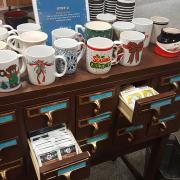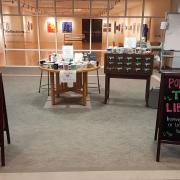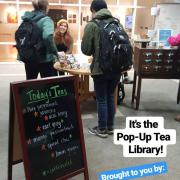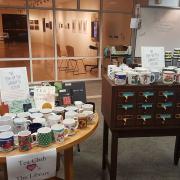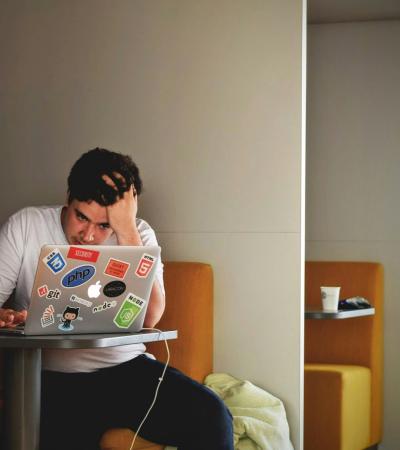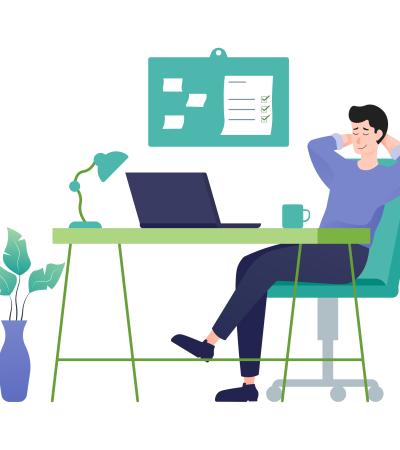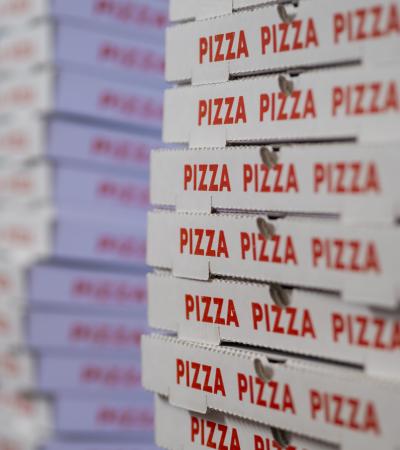In early December, the University Library at Sonoma State (SSU) collaborated with the student-run SSU Tea Club to help students de-stress as they headed into the most stressful time of the semester.
Offered during Sonoma State's so-called "Dead Week," the week before finals, the Pop-Up Tea Library comforted library visitors with free steaming mugs of tea, Monday through Friday, from 6 to 9 p.m.
Advanced Planning
In early October, we reached out to the SSU Tea Club members to gauge interest in collaborating on a de-stress Dead Week program. Once they agreed to the partnership and signed up for hour-long shifts from 6 to 9 p.m. each weeknight, we sent out a campus-wide email asking for old mugs and tea bag donations. Throughout the month of November, we collected about 40 mugs and a variety of tea.
The week prior to the event, we created signage with Canva that provided instructions on how to engage with the Pop-Up Tea Library. We also created a checklist for volunteers that covered the set-up and tear-down of the tea station.
To tie in with the tea theme, we pulled about 10 related books to display during the event.
Marketing
Since the program was modeled after pop-up shops and food trucks, we chose not to advertise or promote the event prior to the start date. Instead, we appeared in the lobby of the library unannounced.
Only an hour into the event did the library and SSU Tea Club promote the event via Instagram stories. As a result of this minimal marketing strategy, students who encountered us throughout the week were delighted with the concept and excitedly shared their "discovery" on their personal social media platforms.
The pop-up marketing approach gave the event a degree of buzz and novelty among students who were inundated with invitations to a variety of finals and de-stress events.
Budgeting
Given the amount of donations from campus staff and faculty, we did not have to spend a large amount on tea or disposable cups. In total, we spent $28 on 240 disposable cups from Costco and had some left over at the end of the week.
Initially, we purchased six boxes of tea (120 tea bags) for about $21 total. We went through our whole stash of purchased tea during our first Pop-Up Tea Library session, but luckily we garnered enough attention among staff and students to boost donations.
During the event, we were also approached by employees from two local tea companies who happened to be at the library. They donated large amounts of tea in exchange for being named sponsors. For those wanting to reduce costs, seek out coffee and tea shops in your area and ask for donations prior to the event.
Day-of-event Activity
Setting up our tea station took one staff person/volunteer about one hour. We were able to use supplies already on-hand at our library, such as:
- A card catalog with each drawer filled with a different type of tea, labeled accordingly.
- Two sandwich chalkboards to create cafe-style signage: one detailing how students could either a) borrow a mug and return it to the station once they're finished or b) take a to-go cup if they're headed out of the library; the other to list the different types of tea on offer, featuring the ones that contained caffeine (this board was updated each day to reflect the changing tea menu).
- Two electric tea kettles set up at a nearby station along with two pitchers of cold water to create an efficient refill flow. Volunteers staffing the event used the water fountain in the library lobby to refill the pitchers.
- An airpot or thermal carafe to allow visitors to dispense water themselves.
- A large cardboard box on a book cart to discard returned mugs. Each night we encouraged visitors to borrow a mug if they were staying in the library to help us be more sustainable and use fewer disposable cups. We asked that the mugs be returned to the tea station once visitors had finished.
About 30 minutes prior to closing, we did a sweep of the library to collect empty mugs. We had signage indicating patrons should leave used mugs on the display table afterhours. (Surprisingly, most of our mugs were returned each night!)
After our first night, we captured the popularity of the program via numbers and photos, which we sent out in a second call for donations on our staff listserv. We received a massive wave of donations in tea and mugs.
Tear-down was minimal. We simply removed all teabags from the card catalog, placed materials like pitchers and electric kettle in a staff kitchenette, and took all the mugs home each night to be washed, returning them to the library the next morning.
The event is fairly labor-intensive. Two people were required to explain the concept and constantly monitor the hot water supply during the three-hour event. The program also involved a significant amount of transporting and washing of the mugs for those trying to reduce costs and avoid buying large quantities of disposable cups.
Program Execution
The program created a great deal of appreciation from students and staff alike during the stressful time leading up to finals. In fact, one patron commented on social media, "The Sonoma State University Library knows how to reduce stress in the weeks before finals!"
Over five nights, we handed out an estimated 550 mugs of tea, far surpassing our expectations. We achieved our goals of providing a supportive study atmosphere and eliminating stress in the library.
The SSU Tea Club also garnered a great deal of interest and was able to boost their social media following as a result of their face-to-face conversations with visitors.
We received multiple requests from visitors to have this program continue; because of its popularity, the library and Tea Club plan to work together to replicate it in future fall semesters. We are also tentatively discussing the possibility of providing an iced tea program for spring semester Dead Week.
Advice
Do not hesitate to ask for donations from the campus or community partners.
If you have a card catalog you can use for the program, it lends to the cuteness factor, which creates community buy-in and great social media posts!
Have at least two dedicated staff members or volunteers to monitor the station during operational hours.
We hosted the Pop-Up Tea Library for three hours each night, but the frequency and duration of the program is flexible and can be adjusted according to your goals and foot traffic trends.

